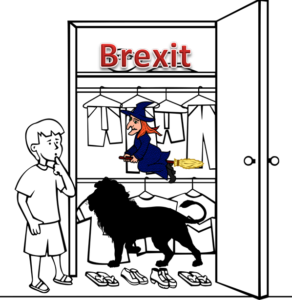Even the haziest among us (myself included) have noticed that we recently had a Big Presidential Election, the results of which were a surprise – to the winners, the losers, the pollsters, the media, the cast of SNL, and even the guy who won.
Of the many millions of people in America who were paying attention to the election on November 8th, 2016 and might have woken up on November 9th, 2016 to find themselves either surprised or not surprised by the outcome, only 3 were not surprised – Michael Moore, Bernie Sanders, and Dora the Explorer.
Dora, being a cartoon character, cannot technically be counted as a member of the population, but she deserves kudos for including a warning about the very real possibility of a Trump win on practically every episode of her show. Unfortunately, given the demographics of her viewing audience, it is unlikely any of them possessed the cognitive skills to make the obvious connection between Swiper, the big orange fox, and Donald Trump, the big orange candidate (or El Grande Naranjissimo) who swiped Hillary Clinton’s anticipated Electoral College votes – which leaves us with a grand total of 2 real live, non-cartoon Americans (out of a possible 242.2 million) who were not surprised by the election results.

That 242.2 million number is a reasonable estimate based on the current estimated U.S. population of 346 million. Roughly 6.5% are in the under-5 age group. This group was not paying attention to the election, being otherwise engaged in playing with blocks, spilling Cheerios on the floor, or watching dangly mobiles over their heads. Some of them may also have been tuning in to Dora the Explorer but, as explained above, they lacked the sophistication to grasp the socio-political message of the show even while they were chanting “Swiper, No Swiping!, Swiper No Swiping!, Swiper No Swiping!”
Another 2% of Americans are people at the opposite end of the age spectrum who, due to mental health conditions associated with the aging process, also weren’t paying attention to the election, being otherwise engaged in playing with blocks, spilling Cheerios on the floor, or watching dangly mobiles over their heads.
I think it’s safe to assume that many of the approximate 20% of the population in grades K-12 were also paying relatively little attention to the election. Lastly, there were some miscellaneous members of the remaining population who weren’t paying too much attention to the election for some miscellaneous reason, because there are always miscellaneous people who do things for miscellaneous reasons – I’d put their number at about 2% of the population.
A generous rounding off gives us 30% of 346 million Americans (or 103.8 million people) who were paying minimal or no attention to the election and, consequently, could not be surprised by its results. That leaves about 70% (approximately 242,000,000) who were paying attention to the election, 241,999,998 million of whom were surprised by the result.
In percentages, this means only an infinitesimal 8.264462809917355e-9% were not surprised and a whopping 9999999917355372% were surprised, which is quite a deviation from the usual percentage of surprised vs. non-surprised people in situations likely to result in a some number of a group being shocked into state of surprisedness.
In a typical situation, such as a surprise party, the percentages would be nearly reversed – with wither just 1 or 0 people being surprised, and all but 1 or all (including 1 faking being surprised) being unsurprised. For an average party size group of, say 50 people, let’s take that rare occurrence where the recipient of the party actually did not suspect a thing. In that case, a party of 50 people would yield 98% unsurprised and 2% surprised party guests.
Most well-known events in history also differ dramatically from this election in terms of surprisedness outcomes. The famous Trojan horse incident comes to mind. Most historians estimate the total number of people involved in that incident to be about 180,000 – the approximate 140,000 members of the Greek fleet (including 40 hiding in the horse) and an approximate 40,000 others inside the citadel of Troy. The event resulted in a total of 40,000 out of 180,000 (or 22%) being surprised, and 140,000 (or 88%) unsurprised.
Let’s review all of this this on a blurry yet helpful pie chart comparison diagram:
SURPRISEDNESS OUTCOMES

Many things in life can result in being surprised, pleasantly or not. A relatively small win on a lottery ticket will result in a pleasant surprise. Seeing the entire payout go to cover the unexpected cost of the fender bender incurred while speeding over to the lottery office to claim your winnings will be an unpleasant one.
The election results were naturally a wonderful surprise for pro-Trumpers and an awful one for anti-Trumpers. Given the popular vote, we can assume that most of those who were surprised thought it was a “Yuge” surprise and also a Bigly unpleasant one. What is more surprising, this Bigly Surprise came on the heels of another Bigly Surprise – that Brexit thing – but that happened in across the Atlantic in a land so far away out on the periphery of the American consciousness that it might as well have happened in Narnia. No doubt, some Americans think it did.

Those Americans who actually knew what Brexit was and where it happened were likely to be more horribly surprised, but only for a moment before returning to their Walking Dead marathon or Candy Crush Level 1,006. So, Brexit was not especially help in preparing them for the shock of electing a President who might be likely to shout things like “I know you are but what am I?” or “I’m rubber and your glue, so whatever you say bounces off me and sticks to you!” at foreign dignitaries just prior to pressing a certain red button.
What with the cries for recounts, concerns about election promises being kept or not kept, accusations of Russian meddling, and plans for impeachment in the works, there is no doubt that we will be in for more surprises and shocks. I believe, as Americans, we should ready ourselves for this by taking part in Surprise Preparedness Training.
Most parents or caregivers already conduct simple Surprise Preparedness Training exercises with babies and small children. You probably know them by their other names – Peek-a-Boo and Hide-and Seek. The trouble is that we do not build on these critical life skill drills and continue them into adulthood. I believe modified versions of Peek-a-Boo and Hide-and-Seek, and similar routines can prove exceptionally helpful preparing us, as a nation, for the continued horrible surprises we may be facing over next 4 years. I have, in anticipation of this need, developed the following useful Surprise Preparedness Training exercises:
Modified Peek-a-Boo for babies
Once babies have become used to the game of Peek-a-Boo, it is time to step up their training by introducing a modified variety of this drill. The modification involces the introduction of surprise face masks that can be worn by the adults while yelling “Boo!” as the child uncovers his or her eyes. Instead of mommy or daddy’s face, with which the child has already become familiar and which no longer provides any shock value, he or she will be startled to see the face of a scary circus clown mask covering a parent or caregiver’s face. This may result in tears at first, but it is essential that the child become used to uncertainty and discord. After several sessions of surprise switches between mommy or daddy or a favorite babysitter and the clown, additional masks – such as a dragon or the Grim Reaper- can be added.

This is good preparation for the adult experience of discovering the very people we rely on to support protect our rights and freedoms may instead trample all over them as carelessly as Godzilla rampaged across the city of Tokyo.
Hide and Seek but Don’t Find
This is a follow-up exercise for children to the familiar game of Hide-and-Seek, where the child searches for a friend or family member but never finds them as they have disappeared altogether. In this simple exercise, the child as the “seeker” will be asked to count to a number such as 50 or 100 with his or her eyes closed and “no peeking.” During this period, the adult in the role of the “hider” should leave the premises (having readied a small suitcase for a brief stay elsewhere). A day or so later, when the child has given up all hope of the adult friend or family member ever returning, the “hider” should magically reappear, offering no explanation (or an unintelligible one) as to the disappearance. This game, when repeated at regular intervals, has a dual benefit of providing a parent with an excuse for a fun getaway, while training children not to get too comfortable with the comforts of their daily lives – just as adults should not get too comfortable with comforts such as healthcare or Social Security, which could vanish from our lives at a moment’s notice. Please keep in mind when engaging in this exercise that it is inadvisable to allow the child to take on the role of “hider” unless they are of legal age and financially independent.

Guess Who for Adults
This is a new guessing exercise developed for groups of three adults, specifically to help them minimize the traumatic effects of unexpected election outcomes. Participants take turns being the “voter,” the “pollster” or the “counter.” The pollster spins a pair of dice (only using sides with 1 to 5 dots) to determine an expected percentage outcome of the “election” and presents the voter with two choices, represented by one-sided pictures of faces attached to popsicle sticks. The pollster then assigns the percentage outcome to either choice and places a bet on that candidate to be the winner. The voter then casts a vote for one candidate by placing a folded piece of paper into a bag. The counter takes the bag into another room where he or she has the option to either count the vote, change the vote, or to add his or her own votes to the bag. The counter returns and holds up the two sticks representing the candidates. With a flourish, the counter turns the sticks so that the picture of the winning candidate faces front and the loser’s picture is turned to the back and shouts “You win!” or “You lose!” at the voter. If the voter has chosen correctly and the pollster’s prediction was incorrect, the voter gets the money that the pollster bet. If the voter chose wrong and the pollster correctly predicted the winner, the pollster gets the money. If both are wrong, the counter takes the money. The voter has the option to “bribe” the pollster by promising a percentage of their bet winnings before each round and may also organize protests against the results in between rounds. 
Expect the unexpected
This is an exercise that can be incorporated into a morning routine for adults. Upon waking up, before doing anything, simply set aside about 10 minutes or so to repeat possible random things relatives or friends may or may not do, such as: Aunt Mabel may call me this morning, or Aunt Mabel may be hit by a car and the morgue may call me. Or: Mary may pick up ice cream on the way home or Mary may cheat on me tonight and not come home. Or: Dave may serve me a delicious dinner or Dave may charge at me with a kitchen knife while making dinner.
After a time, this can be extended to a variety of other people and circumstances, such as: My boss will fire me at this meeting. Or: The person on line behind me may be a robber about to steal my wallet. Or: This plane I’m boarding may crash upon take-off. Those who practice these exercises faithfully will be able to maintain a constant state of readiness for any unpleasant surprises, but should be warned that overdoing them may lead to side effects including: paranoia; delusions; fear of loud noises;(phonophobia); fear of leaving the house (agoraphobia); and fear of crowds (enoclophobia). These side effects should not come as a surprise.
Nor should the gargantuan total nationwide cost of therapy sessions over the next 4 years for those who neglect their Surprise Preparedness Training and find themselves adrift in a sea of shock waves without a life preserver. Such therapy may or may not be covered, depending on (Surprise!) cuts to Medicare– or (Surprise!) no cuts to Medicare.
Until…whenever
Lazy and Hazy
Boo!

